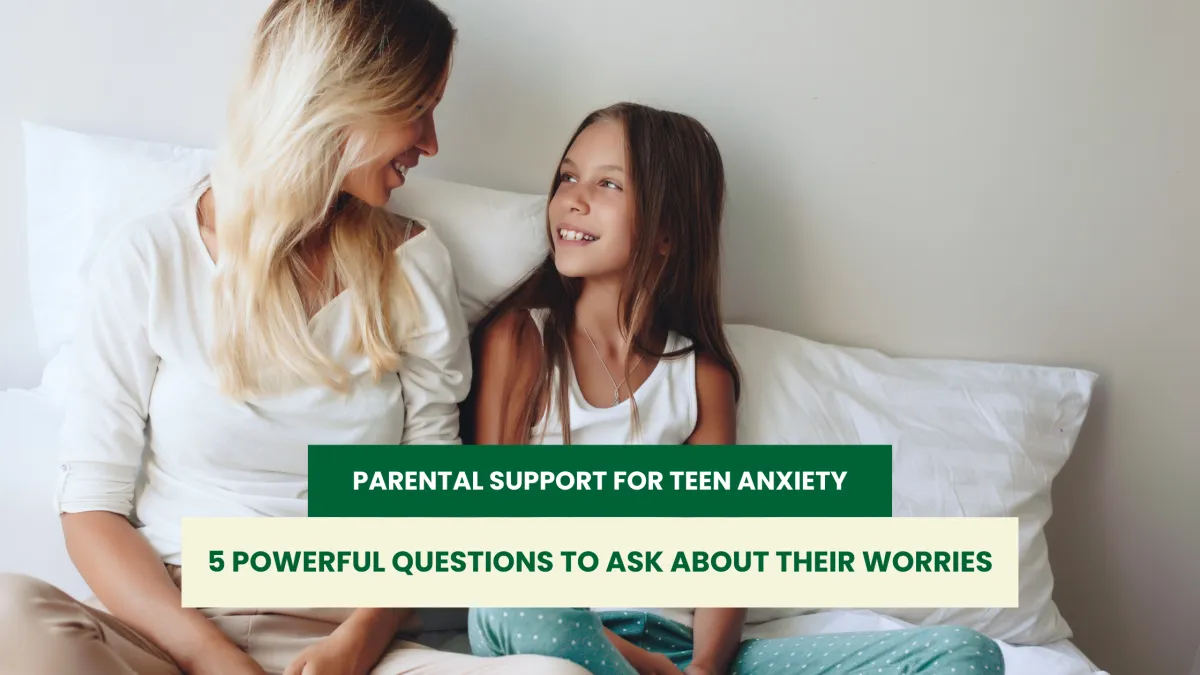
Parental Support for Teen Anxiety: 5 Powerful Questions to Ask About Their Worries
Teens often carry more stress than they show—and knowing how to get them talking is key. Anxiety and emotional overload can make it hard for teens to open up, but asking the right questions can break through silence and build trust. If you want to understand your teen better and reduce emotional distance, learning how to ask the right questions is a powerful way to offer real parental support for teen anxiety.
Why Questions Help Build Parental Support for Teen Anxiety
When teens feel interrogated or judged, they shut down. But when you ask open, thoughtful questions, you invite them to reflect, express themselves, and feel safe. This is the heart of parental support for teen anxiety—being present, curious, and nonjudgmental in moments of uncertainty.
5 Questions to Ask Your Teen About Their Worries (And Why They Matter)
Here are five powerful, open-ended questions that promote emotional awareness, self-expression, and deeper connection with your teen—without overwhelming them. These questions are especially effective for building parental support for teen anxiety because they invite dialogue without pressure.
1. “What’s been on your mind a lot lately?”
This broad and gentle question gives your teen permission to share whatever feels most present—without forcing a specific topic. It removes assumptions and puts them in control of the conversation.
💬 Why it works:
It’s less intimidating than “What’s wrong?” and allows your teen to bring up school, friendships, anxiety, or something completely unexpected. It signals that you’re available to listen to whatever they’re ready to share—no judgment.
2. “When do you feel most overwhelmed during the week?”
This question focuses on time and context, helping you and your teen identify triggers. Is it Sunday evenings? Math class? Social situations at lunch?
💬 Why it works:
By narrowing down when anxiety shows up, you get clues about what may be contributing to it—and when to offer extra support. Understanding patterns is a key part of delivering intentional parental support for teen anxiety.
3. “What’s something you wish people understood about how you’re feeling?”
This gives your teen a voice to explain their inner world. It encourages empathy, self-advocacy, and builds the muscle of emotional language.
💬 Why it works:
Teens often feel misunderstood—especially when anxious. This question invites clarity and connection, helping them feel seen. It also equips you with insight into how to better respond in the future.
4. “If your anxiety could talk, what would it say?”
This creative and non-threatening question helps teens externalize their anxiety, making it feel more manageable. It shifts the focus from “I am anxious” to “Anxiety is saying…”
💬 Why it works:
Externalizing anxiety turns it into something they have, not something they are. This small shift can make a huge difference in self-compassion and emotional control—two essentials in meaningful parental support for teen anxiety.
5. “What helps you feel calmer when you’re stressed?”
This question spotlights strengths and strategies that already work. It empowers teens to reflect on what makes them feel safe and supported.
💬 Why it works:
Rather than focusing solely on problems, this question highlights solutions. It gives you a guide to show up in supportive, personalized ways—whether that’s offering a quiet space, taking a walk together, or simply being nearby.
How These Questions Strengthen Connection
Using these questions regularly:
Builds emotional vocabulary
Normalizes conversations about mental health
Demonstrates trust and patience
Enhances your ability to offer parental support for teen anxiety in everyday life
Still unsure where to start? Try this helpful parent guide to teen anxiety from ADAA for deeper insight and practical tools.
Connection First, Then Coaching
Before offering solutions, listen. When teens feel truly heard, they become more open to guidance and growth. Keep asking questions, stay curious, and stay calm. That’s the foundation of powerful parental support for teen anxiety.
👉Book a Free Consultation with a licensed teen therapist and learn how to strengthen communication and reduce anxiety at home.
